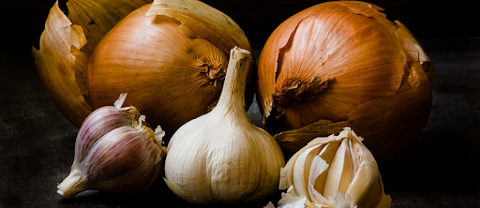Colic, which affects one in five newborns, is one of the most puzzling, perplexing, and frustrating problems a new mom may encounter. In this blog, we'll talk about how the mother's diet, in particular, affects it. You'll receive guidance on how to alter your diet to prevent colic, including information on foods to stay away from when breastfeeding.
What is Colic?
Colic in babies, also known as infant colic, is defined as periods of crying that last more than three hours per day, three days per week. Crying usually occurs in the late afternoon or evening. When you get to know your baby, you learn to look for obvious causes of distress when they cry. Are they starving? Is it hot or cold? Is it time to change their diaper? Have they been overstimulated? A colicky baby may be crying for one of these reasons. Or they could be crying for an unknown reason.
Can Your Diet Really Upset Your Breastfed Baby?
While the exact causes of colic are unknown, there is a lot of speculation about what might cause this condition. Some people believe that colic is caused by an imbalance of healthy gut bacteria, a childhood migraine, overstimulated senses, acid reflux, an underdeveloped digestive system, food allergies, and tobacco use.
Another widely held belief is that colic is linked to the mother's diet of a breastfed baby. Studies suggest that excluding highly allergenic foods from a nursing mother's diet could reduce crying and fussiness in her newborn's first six weeks of life.
There are a number of reasons that this might be the case. First, it is well-recognised that a nursing mother's food impacts their newborn. It can cause discomfort and crying if the mother eats something that bothers the baby's tummy. Additionally, colic and digestive distress appear to be related; gassy newborns with colic typically experience relief after passing gas.
In reality, numerous studies have demonstrated that altering a mother's diet can significantly reduce the severity of colic symptoms, namely the amount of time that babies cry each day. Other studies have discovered a connection between the breastfeeding mother's ingestion of particular meals and the infant's colic. In the end, research points to a possible benefit of an elimination diet for treating colic symptoms.

Foods to Avoid
Common Allergens
One category of colic foods to avoid while nursing is those that many people have an allergy to, such as:
- Cow’s milk
- Eggs
- Wheat
- Peanuts, tree nuts
- Soy
- Fish
Cow's milk is the most common allergy among infants. Studies have found that 74% of breastfed babies whose mothers ate a low-allergen diet eliminating all of the above ingredients, had significant improvement in their colic symptoms. These can cause wind in babies, and if your baby is experiencing colic symptoms, this is a simple way to try and avoid gas and wind. There are plenty of dairy alternatives that will taste good and ensure your baby is happier without the effects of wind, which can be unsettling for a newborn.

Foods to avoid baby colic - Gluten
Wheat and other gluten-containing grains - are common contributors to increasing colic in babies. If you have a baby that is sensitive to the gluten you are eating and shows signs of colic, avoid wheat, oats, barley and rye where possible. Switching to a gluten-free alternative is simple and can make a huge difference.

Foods to avoid baby colic - Garlic and onions
Avoid veggies like garlic, onions, cabbage, turnips, broccoli and beans, as they are commonly associated with affecting a mother’s breastmilk and therefore increasing the likelihood of colic.. Curries can also be a problem if you didn’t have them regularly while pregnant. Have a look at this blog post with twelve recipes for curries that don’t include onion or garlic.

Foods to avoid baby colic - Caffeinated drinks
If you love your caffeine, but it’s causing discomfort to your baby, you might need to go without tea or coffee or switch to a natural or organic tea that is calming for babies tummies.

Foods to avoid baby colic - Specific fruits
Apricots, rhubarb, prunes, melons, and peaches can cause a flare-up of colic for your baby, so avoid these fruits where possible if you have a baby that is sensitive to wind.

We would advise controlling your diet to avoid foods that could make your baby more likely to experience colic. To determine what foods may be causing your baby's fussiness and to keep track of what you eat each day, it might be a good idea to keep a food journal.
Eliminating certain foods that may cause colic can lead to a happier and healthier baby and a happier, more rested mom!


